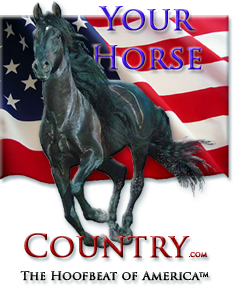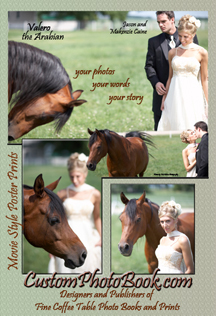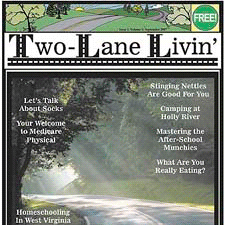|
Two Lane Livin' Your Horse
Country Column archives...
July 2010 -
These
hot July days have me humming “Summer in the Country”.
Written by Dawna B. Smith, Journalist
and Reporter, writer of the monthly "Your Horse Country" column for Two Lane
Livin' Magazine
Hot town, summer in the country
Flies
on the horse’s back getting dirty and gritty
been
sprayed down, isn't it a pity
doesn't
seem to be a fly left in the city.
We
have 350 of only 3,000 blood sucking horse fly species found worldwide,
plus barn flies, bot flies, deer flies, and the famous fruit fly.
Where’s Carmen Miranda when you need her?
Male
horse flies have no mandibles. It’s the female that requires a blood
meal for reproduction, using her small, serrated mandibles to rip or slice
her victim’s flesh apart.
Here’s some helpful fly control hints:
Get
rid of manure or kick into tiny pieces so it will dry fast.
Use
protective fly sheets.
Make
a fly trap using a “clear” large plastic soda bottle with lid. Make
three dime sized evenly spaced holes in the top third. Fill with several
raw meat balls, and a dash of old milk. Fill with water about two inches
below the holes. Tie a string around the neck base, and hang one on every
other sunny fence post. It takes hot sun to putrefy the meat. They will
fly in and drown.
Use
Fly Predators during summer, by sprinkling around manure piles, and let
them destroy the flies’ immature pupae before they grow up and wreak
havoc.
Consider
Pyrethrin (derived from Chrysanthemum
flowers natural)
or Permethrin (synthetic) sprays. Both are non-persistent, biodegradable,
and break down easily when exposed to light. These neurotoxin sprays
attack the nervous systems of all insects, and inhibit female mosquitoes
from biting. When not present in amounts fatal to insects, they still have
an insect
repellent effect (great for horses). Mix your own from
Permethrin-10 concentrate and save money. CAUTION: Toxic to Cats and Fish.
70%
of the world’s supply of pyrethrin comes from small-scale farmers in
Kenya
, where Chrysanthemum
flowers were first
introduced in the late 1920’s. Before commercial production, crushed
dried flowers were used to kill lice and fleas on humans and animals.
Use
Horse Guard Wasps, provided FREE by Mother Nature. A type of sand wasp
found in our area, which actively hunts horse flies. It’s fast flying,
very large, and long (up to 2 inches). It has brownish wings, its middle
part covered with hairy, reddish and black areas, and its rear segments
with black to reddish brown markings with light yellow stripes. Sadly,
it’s often mistaken for a hornet and is killed, reducing its numbers,
and making our horse fly problems worse.
Each female wasp will paralyze up to 60 flies as food for each nest, and
this hardworking horse guardian benefactor makes a new nest for every egg
she lays. She burrows about 5 inches deep to lay her egg. Then she zips
around bringing back one paralyzed
horse fly after the other until her nursery is full, closes it up, and
then starts digging again! The females dig nests close to each other,
creating large and dense nesting colonies. You go GIRLS!!! Protect our
horses and cattle!!!
Next time you’re in the pasture, see if your horse doesn’t mind its
guardian’s kamikaze flight actions, large size, and sonorous buzzing.
Take the hint, and know that you shouldn’t mind either. They’re not
aggressive, and rarely sting unless stepped on or grabbed.
Hot
town, summer in the country
Flies
on the horse’s back getting dirty and gritty
Horse
Guard Wasps, take no pity
doesn't
seem to be a fly left in the city!
Bio:
Dawna Smith,
Journalist and Reporter, writes the monthly column "Your Horse
Country" for Two Lane
Livin' Magazine, based in West Virginia, as well as numerous articles regarding pain related medical issues for
LivePainFreeNow.com. A photographer and free lance writer, her op-ed articles have been published regarding a variety of subjects.
She and her husband have been strong advocates for the elderly and disabled since 1998,
and formed the non-profit HEADINGS (helping elderly and disabled in need gain support) to help ensure that legislature, Department of Health and Human Resources, and the Centers for Medicare and Medicaid heard their voices.
She can be reached at dawna @ yourhorsecountry.com
304-765-0490
|




